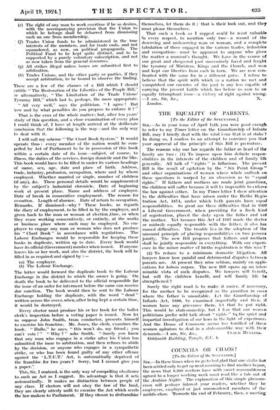THE EQUALITY OF PARENTS. "To the Editor of the SPECTATOR.]
SIR,--As in your issue of April n"-th you were good enough to refer to my Times letter on the Guardianship of Infants Bill, may I briefly deal with the vital issue tEat is at stake ? In doing so, I confess to an attempt to convince you that your approval of the principle of this Bill is piemature.
The reasons why our law regards the lather as head of the family are two : (1) To impose upon him definite respon. sibilities in the interests of the children and of family life generally. All talk of " rights " is fallacious. 'I he present Bill is the result of agitation by the " Six Point Group " and other organizations of women whose whole outlook on these questions is warped by an obsession as to " equal rights." If fathers and mothers are made joint guardians, the children will suffer because it will be impossible to enforce the law against either. In my Times letter I drew attention to the difficulties that have arisen under the Births Regis.. tration Act, 1874, under which both pan nts have equal responsibilities. So great are these difficulties that in 1007 a Liberal Government, when providing for a fresh kind of registration, placed the duty upon the father and rot the mother. Yet because this Act of 1607 made the doctor or midwife equally responsible with the father, it also has caused difficulties. The trouble lies in the adoption of the unsound principle of placing responsibilities cn two persoes jointly. The new Bill proposes that fathers and mothers shall be jointly responsible in everything. With our experi. ence in the minor matter of births registration is this wise ?
(2) To reduce to a minimum domestic litigation. All lawyers know how painful and detrimental disputes between parents are. At present they arise seldom, mainly on appli- cations for habeas corpus. The new Bill opens up an inter- minable :vista of such disputes. We lawyers will benefit, but will the children benefit, and will family life be strengthened ?
Surely the right road is to make it easier, if necessary, for the mother to be recognized as the guardian in cakes where the father is unsuitable. Let the Guardianship of Infants Act, 1888, be examined impartially and then, if women have any grievance there, let that be put right. This would be statesmanship, but I fear that our women politicians Prefer :wild talk about " rights " to, the quiet and impartial investigation of our laws in the light of experience. And the -House of Commons seems too terrified of -them women-agitators to -deal in a statesmanlike way with their
demands.—I am, Sir, &c., MuLtiNs. Goldsmith Building, Temple, E.C. 4.


































 Previous page
Previous page